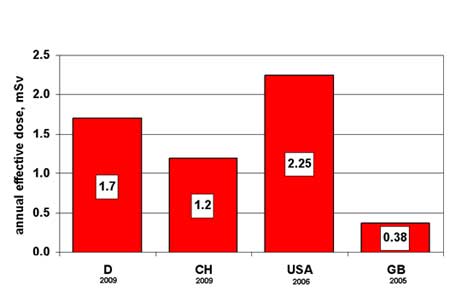Radiation exposure, medical, Germany
 scroll scroll 
The average effective dose of the population in Germany due to medical application of ionising rays and radioactive substances amounts to 1.8 mSv per year. X-ray diagnostics make up the largest part of civilisation-related radiation exposure of the population in Germany. The frequency of x-ray examinations in Germany amounts to 1.6 examinations per caput per year and the effective dose amounts to 1.7 mSv/a. Although there is a declining trend in some x-ray examinations, which can be explained by the growing use of alternative examination procedures, there is an increase in modern dose-intensive examinations such as computer tomography. Nuclear medicine in Germany contributes about 0.1 mSv per caput per year, considerably less to radiation exposure of the population because of the lower application frequency compared to x-ray diagnostics and the partly lower effective dose per examination.
Type of examination |
Effective dose,
mSv |
CT abdomen |
8.8 - 16.4 |
CT spinal column |
4.8 - 8.7 |
CT thorax |
4.2 - 6.7 |
CT head |
1.7 - 2.3 |
|
|
Arteriography |
10 - 30 |
Colon |
5 - 12 |
Stomach |
4 - 8 |
Urinary tract |
2 - 5 |
Lumbar spine |
0.6 - 1.1 |
Pelvis |
0.3 - 0.7 |
Thorax |
0.02 - 0.04 |
Tooth |
0.01 |
Average effective dose for various x-ray
examinations, Germany

Average effective dose of population in different
countries due to x-ray diagnostics
back
|
|
ENS conferences |
| |
 |
TopSafe 2017
12-16 Feb. 2017
Vienna, Austria |
 |
PIME 2017
19 - 22 March 2017, Middelburg Netherlands |
 |
RRFM 2017
14 - 18 May 2017 in Rotterdam, Netherlands |
 |
ETRAP 2017
30 May - 2 June 2017, Valencia, Spain |
|
|